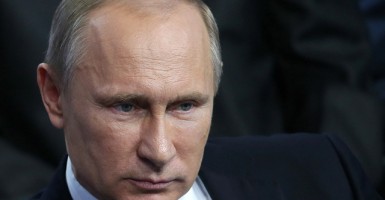George Kennan was the State Department‘s top hand on Moscow. As the U.S.-Soviet alliance unraveled after World War II, no one seemed to understand the Kremlin better than Kennan.
One of his most insightful observations was cautionary: Do not think about the standoff with the Soviet Union as principally a military confrontation.
“[Y]ou didn’t always have to occupy another country to dominate its life,” Kennan noted. “You could threaten it, or you could subvert its government by various ways, including the time-honored phenomenon of puppet government.”
The message was clear: Moscow had many ways of establishing its domination and authority.
The White House would do well to recall Kennan’s warning today, as the Kremlin dips once again into its Soviet-era bag of dirty tricks. At present, Vladimir Putin seems to be outwitting the West.
Already he has moved the goal posts, reshaping the borderlands between Russia and the transatlantic community. The changes began in 2008, when Russian forces wrested control of South Ossetia and Abkhazia from Georgia and recognized them as “independent states.”
The process is being repeated this year in Ukraine, where America and Europe have now written off Crimea. In the confrontation with Moscow, the West has defined down “success” to to mean “Russia pulls up short of grabbing Ukraine outright.” If Putin doesn’t march in Kiev, the West will declare a diplomatic victory and call it a day.
That would be a tragic mistake. The West can no longer ignore reality. Regardless of whether the weapon is a platoon of goons or political warfare, the Russian regime’s aspirations are a threat to the peace, prosperity and security of the transatlantic community.
Yet even after weeks of angry anguish over Russia aggression toward Ukraine, the Obama administration clearly still doesn’t get it. It pursues incremental sanctions, micro military deployments, verbal barrages and now, incredibly, hashtags—all in the effort to get Russia to act “normal” again.
Mr. President, Russia is acting normal. Force, intimidation, lies, corruption, suspicion and greed are business as usual in the Putin polity.
Washington would be wise to acknowledge that — and to reflect on Kennan’s chief advice in how to handle Moscow.
There’s no need to swing from the current toothless response to full-bore militarization to bring Moscow to heel. Putin commands a second-rate Soviet Empire. U.S. strategy should be to get back to the place where America can ignore Moscow.
Yes, military power does have a role to play. The U.S. needs to keep NATO credible. For example, today, America doesn’t have a single operational tank in Western Europe. That sends the wrong message. More realistic would be to retain three ground brigades in Europe: one for training; one ready for rapid deployment in case of emergency, and one available to exercise with allies, thereby demonstrating Western solidarity and improving interoperability.
The U.S. should also junk arms control cooperation with Moscow. Putin will build the nuclear force he wants, regardless of what America does. Washington should scrap the New Strategic Arms Reduction Treaty, build missile defenses and modernize the nuclear arsenal based on what’s best for U.S. security — not what’s best for let’s make a deal with Moscow.
Two more suggestions:
- Play the human rights card. The Magnitsky Act is a powerful tool to name and shame Russian leaders — much better than the silly sanctions game going on now.
- Fix the dysfunctional U.S. public diplomacy operation. It’s time we went after the Kremlin’s lies and disinformation and set the record straight.
Moscow employs every trick in the Soviet-era book of “Winning Through Intimidation.” It’s time the West showed that, we too, can work from the same playbook.
Originally appeared in The Washington Examiner.





























